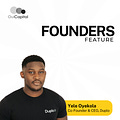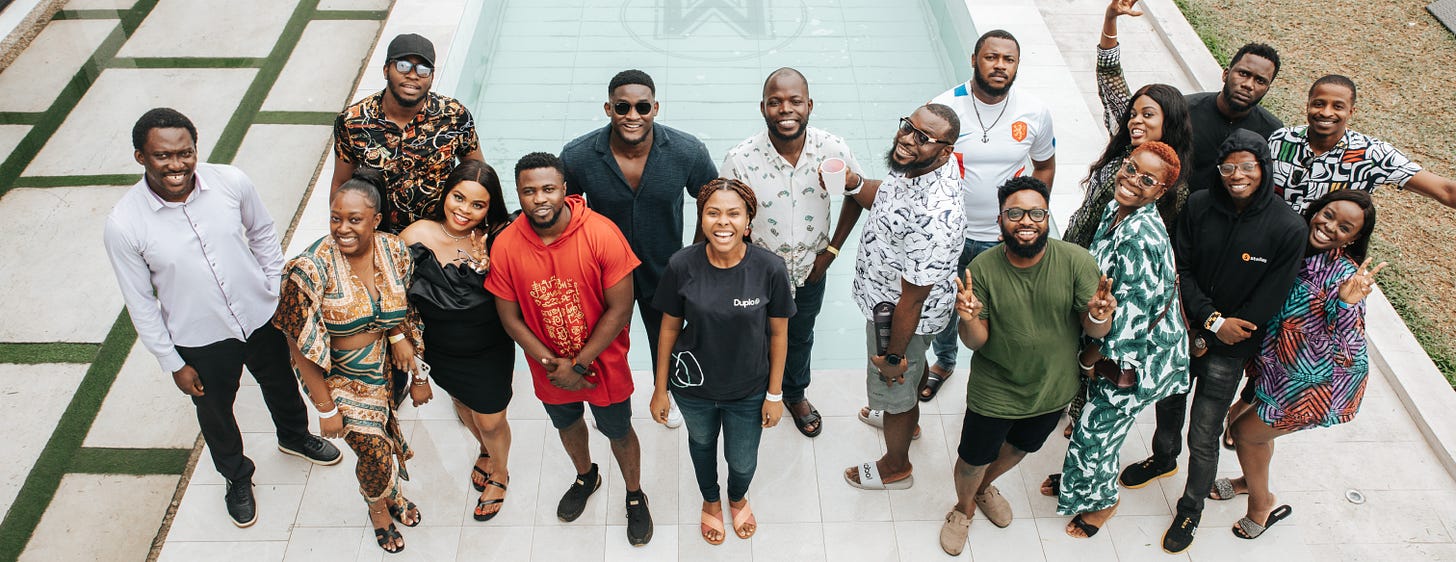Coming from the United Nations (UN) after a two-year stay where he worked as an Economic Policy Officer advising sub-Saharan governments on national urban policies, Yele’s interest in international development contributed to his role at the UN. He saw that there were other ways to be a part of this- entrepreneurship.
He ventured into the ecosystem building his first company, Julla- a financing platform offering tools for businesses to start, manage and grow with ease. According to him, the company failed due to a lack of experience & connections in the ecosystem and solving a problem in a market that he didn’t understand at the time.
Yele didn’t let that stop him. He joined Carbon as a Product Lead; simplifying how merchants provide financing to their customers. He was on the team that built the first version of Carbon’s Buy Now Pay Later (BNPL), CarbonZero. Yele’s role at Carbon helped bridge the knowledge gap and provided a softer landing into the ecosystem for him.
Yele’s passion for solving problems for the continent plays a major part to why you are reading this. Meet Yele Oyekola, Co-Founder & CEO, Duplo
Join us as Yele walks us through his building journey…
How did you come up with the name, "Duplo"?
Duplo basically means lego for kids. When we launched Duplo, the initial idea was to build payments infrastructure for small businesses to launch upon. We were thinking of building structures as our payment infrastructure and small businesses as kids. Over the past couple of months, we’ve made a pivot. Now we’re simplifying business payments for enterprises here in Africa.
In a one-liner, what problem is Duplo solving?
Business payments are usually late, clunky and paper-based.
What do you love about building Duplo?
The people I get to work with on a daily basis. My co-founder and I get to choose some of the most amazing folks to solve these problems with on a day-to-day basis and that’s amazing.
The transformative nature of Duplo’s solutions to the businesses we currently support. When you think of simplifying business payments in millions of naira and dollars for these businesses, the potential is massive.
The global nature of the problem and solution. Business payments are contextual across different countries and continents but the root of the problem is the same globally. Business payments are still very manual, paper-based and clunky. Being able to solve a global problem and scale across the world is something I love about working with Duplo.
Lastly, the fact that we’re actually solving real problems and helping economies grow is another reason I love building Duplo.
What is that one piece of advice you’d give to aspiring founders?
Based on my experience as a second-time founder, here’s a few:
Fully understand the space you’re about to jump into. The best way to go about this is to work at a startup doing something similar for a few years to gain experience and network.
Solve a problem you actually care about. The days can be very long, the experience can be very tough. It’s literally up and down every single day and sometimes that’s what will keep you going.
Logically solve problems that are really big in geographies that are massive as well. If you’re solving a deep problem in Nigeria, investors would love that.
If you’re a first time founder, don’t do it alone. Start building a connection with potential co-founders.
Fundraising: The first thing is to ensure that you’re solving a deep and big enough problem in a massive market with the right team. Now we’re seeing a lot of founders becoming liquid in terms of finances and are becoming investors. They could be your first point of call because they will help you validate your business idea to their investors as well and that could also help the investment process.
Lastly, never stop iterating. Your ideas will change, your opinions will change; be very open to that because the market is what dictates what and how you build.
How do you measure success as a founder?
My colleagues feel motivated every single day to solve this problem and it is attributed to having a conducive work culture, solving a big enough problem & growing fast.
The customers we’re solving for are seeing the value of what we’re providing. A good way to measure that will be to ask “Will they cry if you take away Duplo from their lives? What will happen to them?”
Return on Capital invested: If I can make anyone who’s invested in Duplo a bit more wealthier.
Satisfaction: Are my co-founders and I deriving joy from what we’re building at Duplo?
Asides from the skillset, what would you say is the most important when it comes to building a sustainable business?
The fulcrum of building a sustainable business is built on:
Your understanding of the problem being solved
Research and customer feedback
Providing a solution that actually solves the problem
Having the right team & being on the same page
Did you encounter any unexpected lessons when you set out to build that you had to learn on your own, without prior guidance
No one prepared me for the complexity of managing people and teams. Human beings are complex with different needs and motivations. Trying to balance this with the business goals & objectives can be a quite unique problem. Now, I’m consistently reiterating beliefs, open to learning and understanding the motivations of my team members.
In the long run, what is Africa benefiting from Duplo?
We’re simplifying business payments to power global trade. If businesses can pay each other seamlessly, more transparently and rapidly across the continent, when you think of that in the context of global trade, we’re improving the way trade happens on the continent. Trade is incredibly critical to how fast Africa grows. This is the primary benefit that Africa will gain from Duplo.
The secondary benefit will then be the jobs that will be created from Duplo with our businesses. More businesses are surviving and there’s access to capital for them.
All of these lie on the transformative impact that Duplo will have on global trade and across the entire continent
What do you do to get over a bad day?
In the past, I’d usually just go for a walk, but now I’d just grab a book and sleep off. Wake up the next day, hoping for a better day.
What has been most surprising on your founder journey?
Everyday there are a few surprises. It’s interesting how no two days are the same as a founder. You always deliver something different everyday.
If you weren't building your startup, what else would you be doing?
If I wasn’t building Duplo today, I’d be a politician. Lol!
Final words?
I hope that more founders get to read this. For aspiring founders, the journey is long and it can be brutal but there’s nothing more rewarding than seeing ideas you wrote on paper or discussed with a friend coming to life and actually changing lives. If you have an idea, please pursue it. Not everything will succeed, but you won’t know without trying.
Again, if you’re a first-time founder, please don’t do it alone. There are a lot of resources and people who are willing to help.




